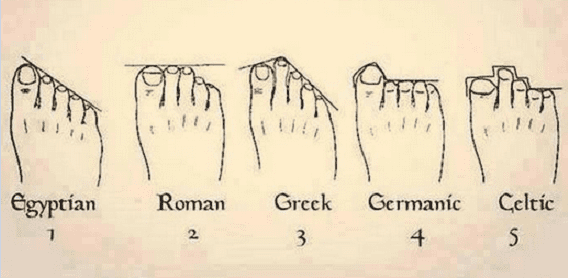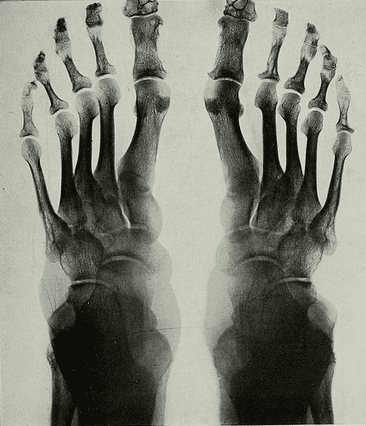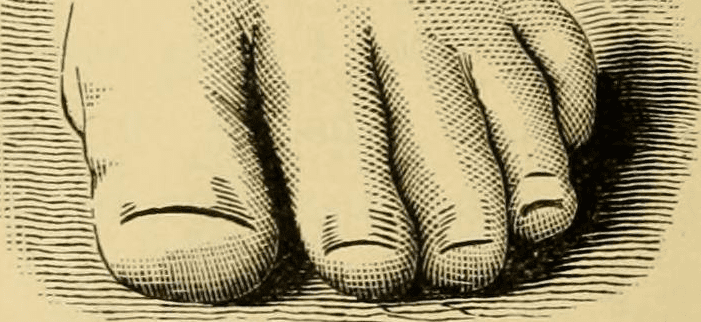Tracing your family history has become easier with digitized records, including immigration documents, newspaper articles, passenger lists, and more. But have clues to your ancestry been hiding under your socks this whole time? As a premise, it seems far-fetched – but some believe the outline of your feet can help you trace your family heritage.
What can the shape of your foot or the length of your toes say about your ancestry? Is there a fundamental truth in phalanges? Let’s have a look.
The Premise of Foot Shape Ancestry
Foot and toe ancestry suggest that by looking at the shape of your feet, you can make an educated guess about the origins of your ancestors. This theory says there are essentially five major foot shapes: Egyptian, Roman, Greek, Germanic, and Celtic feet. Each group has a particular outline and arrangement of toe lengths, which hint at the population origin.

Celtic Feet
According to feet ancestry, Celtic feet have the most complex shape, with a large but short first toe, an exceptionally long second toe, and the remaining toes tapering to a small pinky. Celtic feet appear to be something of a combination of the Germanic and the Greek toe shapes, sharing the larger first toe of the German with the variety of lengths (especially in the case of the second toe) of the Greek.
Compare your toes to Celtic feet. Maybe you’ve got the luck of the Irish in you. Or maybe on closer inspection you’ve got a long first toe with all the others tapering down from there? In that case, you may have the so-called Egyptian foot.
But, can these archetypal shapes really tell us anything about our ancestry? What does science have to say about this idea?

Problems with Foot Shape Ancestry
It’s important to note that there is no scientific evidence that our feet conform to archetypal shapes, or that foot shape ancestry is an accurate way to trace your heritage. Data collected on multiple populations show a trend of their second toe being the longest (as seen with the Greek foot). For example, the Ainu people, an indigenous community in Japan, exhibit the second toe as the longest in 90% of individuals (an extreme example). However, it would be bizarre to think that the Ainu originated in Greece.
If we consider the claims of toe ancestry as a potential way to categorize an actual genetic group, then we need to look critically at the words used to describe the foot shapes. Why Egyptian, Roman, Greek, Germanic, and Celtic feet?

Where These Shapes Came From
Speaking primarily of the Egyptian, Greek, and Roman feet ancestry shapes, these are the idealized foot form in their respective culture’s art. For example, the Greek foot is one you can see on the statues that adorn the Acropolis (also the Statue of Liberty as it happens). While this may indicate that a majority of Greeks of that period had a foot shape like that one, it is much more likely that that was simply the standard of beauty at the time.
The Myth of “Original” Populations
Many modern ideas surrounding the concepts of “Germanness” and “Egyptianness” are just that: modern. The idea of an “ethnic German” was one essentially constructed in the 19th century when that area of Europe — traditionally divided into multiple different regions such as Prussia, Saxony, and Bavaria – was unified as the State of Germany. The “Germans” as the Romans knew them were a diverse mix of people and cultures. Romans called this group Germans because Rome saw them as barbarians and didn’t care to learn more about them.
The idea of foot shape ancestry and toe shape ancestry is rooted in a similar misconception that populations were ever made up entirely of one group. Human populations have migrated, fought, mixed and mingled throughout time. The idea that there was ever a monolithic population with Celtic feet is rooted in a grossly oversimplified version of how and where humanity has lived.
So, can you learn about your family origins from your foot shape? Possibly not. However, it is fun to have a look – and this idea could help inspire younger generations to learn more about their ancestors.

Irish, Scot, Native American with Greek feet.
Love it!
100% Greek
I find Greek feet the hottest !
I’ve known since childhood that my maternal grandmother had Indian blood; then a few yrs back I saw sketch of feet and the 2nd and 3rd toes of an Indian are higher than the others of all other racial stock. This is the toes I have inherited.
Two years ago I came across records showing I have SEVEN tribal links: amazing!
ATTIGNAWANTAN to WENROHRONON MOHEGAN to NARRAGANSETT
TIONTATI to WENROHRONON NARRAGANSETT to MONTAUKETT
WENROHRONON MONTAUKETT
to to
KANIENKEHAKA KANIENKEHAKA
ATTIGNAWANTAN and TIONTATI are of the confederacy known to us today as the Huron
WENROHRONON known as the Wadat or Wyandot
MOHEGAN and NARRAGANSETT are New England Algonkian tribes
MONTAUKETT is an isolated tribe on north fork of east end of present day Long Island; an Algonkian tribe
KANIENKEHAKA, known to Hurons as MAHAUG; term was corrupted by French to Mohawk
The KANIENKEHAKA are members of what the Hurns termed Hieroquoddy, a term meaning ‘Real Asp’ denoting fierceness of warriors
Term Hieroquoddy corrupted by French to Iroquois
My Kanienkehaka blood comes down through Dutch families in the Central Hudson Valley.
What does it mean when your third toe is the longest toe? My family tend to Greek toes, but my third toe is longer than my second.
Wanda,
If you compare the pictures above, it may well be that your unique feet have an interesting Greco-Roman admixture that’s gone on behind the scenes. You say that your family tends to Greek toes, but you may well have inherited some Roman influence that gives you your distinct shape today. This might also help explain your lifelong tendency to give people the “thumbs up” or “thumbs down” signs when they please/displease you.
By Indian mythology you will live long in years
If it wasn’t in the middle of winter and it’s cold in here, I would take off my shoes now and look at my toes. I’m gonna copy this article and send it to all my sisters. ha ha.
All of us will be checking our toes in the next couple of days.
Thanks for writing us, Anne. Hopefully you can do your foot examination in front of a wood stove, fireplace, or a heater!
Irish (69%) with Greek feet. Same as my mother & grandmother.
My feet outlines Egyptian yet in another test Roman yet not in my feet. So it’s never accurate.
Liked your Foot article and Mayflower roll call article.
Thank you, Sally.
This is all very interesting even though it may not be of much good to determine one’s genealogy. But it — maybe — would be of some benefit to know of the different configurations of the toes on a person’s feet. Those who manufacture shoes (foot ware) need to be a bit alert to the different foot configurations I would think. Interesting to say the least.
I have also heard that the Egyptian feet are called perfect feet!
Only if you subscribe to the stereotype that says women in particular should have slender feet to match the rest of their bird-boned, slender bodies. Unfortunately most shoe manufacturers seem to agree so anyone with more square shaped feet finds huge difficulty in getting shoes that are comfortable. I’ve been told that “You shouldn’t have let your feet spread” and “Your mother probably didn’t get you proper shoes when you were young” amongst other things. I now have my walking and motorcycle boots made to measure.
You are seeing the Celtic, slim European feet. To Europeans, histprically a wide, spreading foot indicated a peasant, Mediterranean ancestry – you know, like Romans, Greeks. And the idea of racial purity said “All proper feet are slender and delicate because WE don;t do the back-breaking labor like slaves and poor people.” I have wide, spreading Native American feet – is spite of North Carolina’s heavily Scottish ancestry! Mom is almost pure Scottish – but dad is desceded from two small NC tribes. I wear a 6 1/2 WIDE.
My feet seem to fall under “Roman” and seem to have the “spreading” right before where the pinkie toe starts. I am Polish and Ukrainian, so the “Peasant” thing is very accurate in my case, or “poor” and “slaves”, as in “Slavs”.
In my opinion the sharp angle of Egyptian toes is a bit much. I love the curve from big to small to be a little more gradual. That being said most feet can be beautiful if taken care of.
Unfortunately, my “Egyptian” feet are probably the most attractive parts of my body.
One should not be so negative about a good idea. Seems we need more current and historical data for a continued “look -see”.
Tabo
Interesting thing about this for me – I have the classic Roman foot shape & my DNA says that Italian is the majority of my gene makeup. Maybe there is something to this……
My feet have the slant of the Egyptian design. However, my toes are stubby, single jointed, ending in a wide side. My stubby little toe can create a bump out in any style or fabric and always attempts to escape the confines of a sandal. That’s describes a chubby Egyptian foot. Go figure.
Egyptian Feet is what I have. According to Heritage.com I have 8.6% DNA from North Africa which includes Egypt. Adds to the anecdotal story. My toes are not stubby I do have narrow heals tho which makes shoes hard to fit.
Thank for the article I found it interesting
What about super high arches? Large rounded big toe and the appearance of webbed smaller toes created by a well spread ball of the foot. Not a true webbing. Appalachian hillbilly mutt? Lol
You have just described my ‘Egyptian feet.’ … Maybe Fred Flintstone was founder of Egypt? I am British, Irish Scottish with red hair blue eyes, fair skin. Very high arch…webbish the middle piggies, large rounded great toe…Ozarkish.
Not a huge fan of bricks for feet but high arches are a blessing at least.
My Egyptian foot? Prone to a number of foot problems including some made by me… bunions, triple AAA… FLAT ARCH or is it fallen… LOL… Can’t judge a person by their feet… thank the gods.
Well, I didn’t make the triple AAA but u get my footprint.
It doesn’t surprise me to find that I am an anomaly, seemingly with a combination of Germanic and Celtic toes. Not only my 2nd toe, but also my 3rd are longer than my big toe, though both of the longer toes are the same length. As it happens, I know that my “Heinz 57” heritage is largely Celtic & Germanic, among others, so your drawings confirm most of what I already knew. This difference is the same on both of my feet, by the way…
Allison
Allison, thanks for my smile of the day. My Ukrainian/Polish uncle used to say my sister and I were “Heinz 57” because our mom(his sister) was Ukrainian/Polish and our dad was German, French, English, Irish etc. My paternal cousin and I curse our weird shaped family feet.
I am Hispanic
Native American
Egyptian
Roman Celtic toes for me
I was born and raised in Germany. My father is German (My grandpa from Silecia Breslau and grandma from Austria) and my mother German -American,with ancestry of ,British,dutch,native american,Hungarian.
Actually, research suggests that the Ainu of Japan were originally Greeks of Ionia (pronounced “Aionia”) that travelled to Japan and stayed there.
As for me, greek parents, born in Greece with norwegian feet.
Very interesting, Yota. Thanks for writing us.
Very interesting! I have an Egyptian foot shape but a little wide, not long and narrow. Woman’s7.5 for 5 ft 7.5 inches. Perhaps someone may have some insight into this. My father’s side is native American, specifically, Muskogee Creek and also English. My mother’s side is Welsh/Irish. Mother’s side all Celtic feet…fathers side, including myself, Egyptian feet. I was told the foot shape came from my native american heritage as that is where the foot shape started being inherited. That would mean Egyptians=Native born American indians?
Native Americans probably have “Egyptian” style because it is similar to the “Mongol” type. Here is full image of types of feet:
https://ancestralfindings.com/your-foot-shape-and-your-genealogy/
So, you can see more images of feet types.
For example, some people from Syriac communities from East Turkey, Iraq, and Syria have the “Oriental” type which is something like a combination of Roman and Egyptian — which is one more proof that this model of research is close to truth. There is also a subgroup “Sardinian.” In my example, one foot has Roman and the other Sardinian. Many people have something in between of the two groups, so it can indicate only that most of us are products of more than one ethnic group.
Very interesting, Coucci. Thanks for writing us!
For those people conflicted based on foot shape, I will clear it up for you: the measurement is based on the Left foot. That is what your feet naturally are. Go by that.
Interesting analysis of the feet. My wife is German and has Germanic looking feet. My ancestors are Italian and Slovak but my feet are Greek shaped for sure.
I do my family genealogy but we never spoke about feet. Someone put a comment on here about how many people were on the Mayflower. It seems that so
many people had ancestors on the Mayflower that it must have been larger than the Titanic. another “fact” is that everybody has Native American blood. I’m
glad I don’t have NA. I’m happy to be me. The way I am. Ken
Greek foot
I was told by a new age type friend that my foot indicated that I had been an Atlantian in a previous life.
Another friend, who has it, said that there were many of us born in the late spring of 1942. Interesting. How would one research that?
My feet are totally German but I’m from New Zealand. I hate the sight of my toes. Is there anyone else out there who has German toes?
Yes i have the same except mine are worst because my 2nd -4th toenails grow straight up from toes i dont know what happened there but im 65yrs & do not wear sandals ..
So glad to see others share their issues; also, the genealogy of the foot shapes & sizes provided.
from another site they stated that the greek was also native American—10-1/2 very wide–with a gap at the big toe. My Mom was adopted so she is a mystery–my dads side came from England. Thank you for the info
Definatley I have Greek feet. Dad and mom both half Greek. Dad also eastern Germanic. My brother has more of the German stocky feet. This was very interesting.
Born in Latin America with traced ancestors to Spain and Sardinia (France). According to his figure I have Egyptian feet, but in another website they list 10 foot shapes and in that figure mine are better described as Norwegian foot type. However, that I know, I have absolutely no Scandinavian forefathers, and my tree runs down to the 1700s. My sister however, has Greek foot type.
Whether you love wearing sandals or prefer closed shoes, it appears that one is better off with Egyptian, Norwegian & Oriental foot shapes.
There is no scientific proof backing these theories, but yes, it can be fun. I am convinced there is a genetical component to it, but not a population group.
https://ancestralfindings.com/your-foot-shape-and-your-genealogy/
ahem………….Sardinia is Italy, maybe you wanted to say Corsica? Corsica technically is France, but geographically and ethnically is still Italy
My right foot is Roman and my left is Greek
23 and me says a dominately scandinavian
According to your chart my left foot is Egyptian and my right foot Greek! DNA says I am 93% Celtic, with a couple % Swedish and a couple more Western European. What can you do with that information?
Kenny
Both feet indicate Egyptian toes but my Ancestry report says roughly 96% of my heritage is European and other… not sure what the other means or what all it contains.
Love the second paragraph under the myth of “original” populations! Thank you.
We’re glad you enjoyed the article, Pinemamma. Thanks for writing us.
Greek. I am of Dutch descent on Father’s side; Fin and Scot on Mom’s side.
Have traced back my history to my great x 9 grandfather…who he and his brother came to New Amsterdam in the 1530’s (forget if it was called that at that point as the big wave didn’t start until 100 years later) and at the time they both arrived here, that’s where my last name comes from. For they were both men “from the town of Hoorn” in Netherlands (North of Amsterdam)…hence the last name they took “Van Horn”. Note…my lineage spelled it WITHOUT an “e” at the end. The brother of my great x 9 grandfather, his lineage spelled it WITH an “e” at the end…don’t know why, but they did.
We had a Van Horn family reunion in my teens and we had a baseball game VanHorn’s with NO E vs. Van Horn’s with an E….we won, mainly because I was a high level baseball prospect at the time, lol.
The Ainu of Japanese are not like the other Japanese and may have a similar ancestor with the Caucasians.